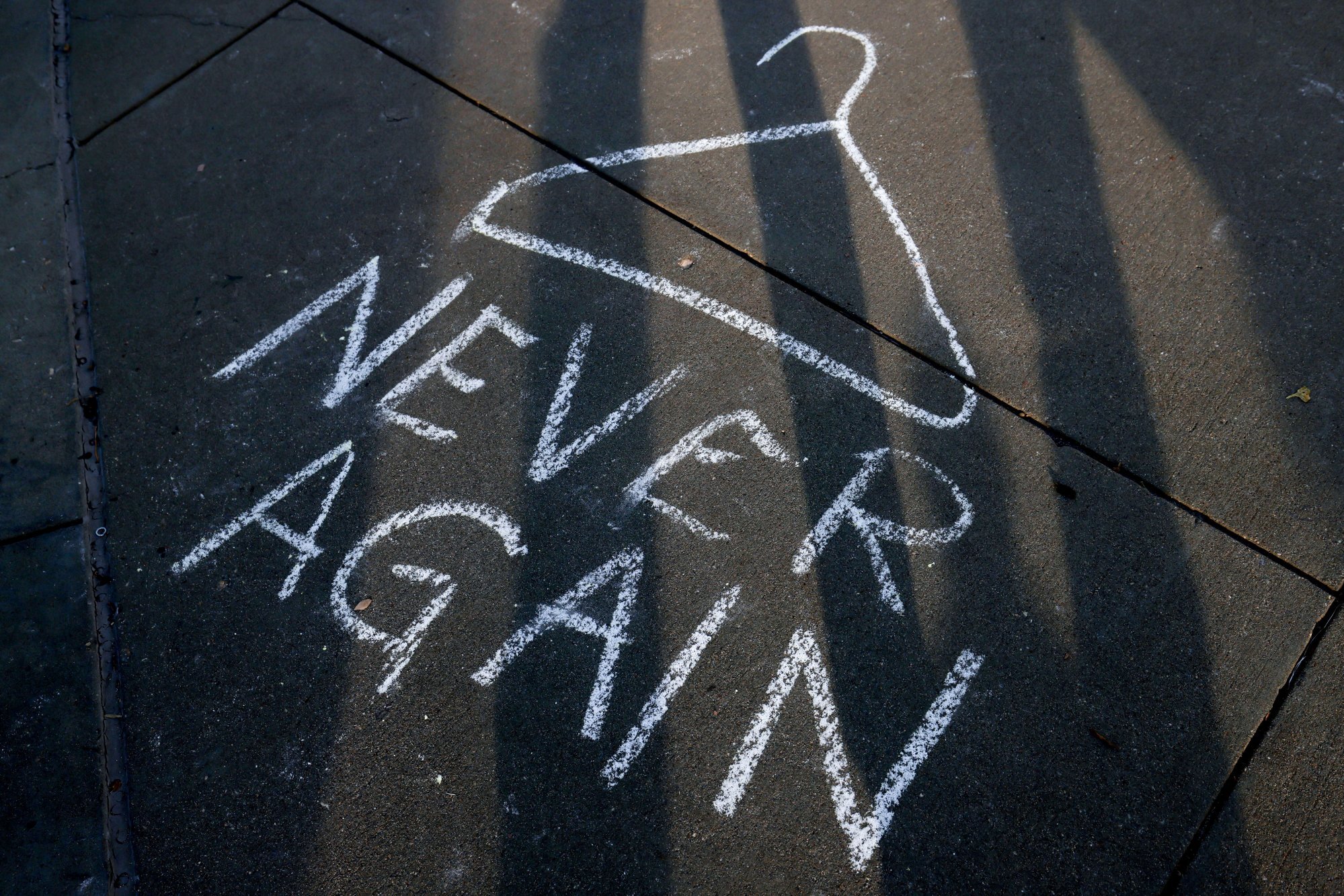
US Supreme Court appears likely to roll back abortion rights
- The 9 justices are hearing arguments over whether to uphold a Mississippi law that would ban the procedure after 15 weeks, with no exception for rape or incest
- At least 4 of the 6 conservative-leaning justices – including two nominated by Donald Trump – seemed receptive to overturning Roe v. Wade
The conservative-dominated Supreme Court appeared poised on Wednesday to roll back abortion rights in the United States by upholding a law in the southern state of Mississippi that would ban the procedure after 15 weeks.
Hundreds of demonstrators gathered outside the imposing court in Washington as the nine justices heard two hours of arguments in the most pivotal abortion case to reach the nation’s highest court in 50 years.
Mississippi Solicitor General Scott Stewart urged the court to uphold the state’s 15-week ban and strike down the landmark cases that enshrined a woman’s constitutional right to an abortion.
While acknowledging abortion is a “hard issue,” Stewart argued that individual states should be allowed to set their own rules.

“When an issue affects everyone and when the Constitution does not take sides on it, it belongs to the people,” he said. “This court should overrule Roe and Casey and uphold the state’s law.”
In a 1973 ruling, Roe v. Wade, the Supreme Court, by a 7-2 vote, held that access to abortion is a constitutional right until the fetus is viable outside the womb, typically 22 to 24 weeks.
In a 1992 ruling, Planned Parenthood v. Casey, the court upheld Roe and said states cannot impose an “undue burden” on a woman’s ability to get an abortion.
The law passed by the Republican-led legislature in Mississippi, a Bible Belt state, would ban most abortions after 15 weeks of pregnancy and makes no exception for rape or incest.
Biden has lengthy meeting with pope as abortion debate rages in US
Should the Mississippi law be upheld, more than two dozen other US states are expected to seek to restrict abortion.
The court is expected to render its decision in June.
At least four of the six conservative-leaning justices – including two nominated by Donald Trump – seemed receptive to overturning Roe v. Wade.
The other two conservatives, Chief Justice John Roberts and Neil Gorsuch, also a Trump nominee, appeared to favour a more cautious approach – upholding the Mississippi law while not going so far as to strike down Roe.
“The thing that is at issue before us today is 15 weeks,” Roberts said.

Lawyer Julie Rikelman, arguing for the Centre for Reproductive Rights, said the Mississippi law is “flatly unconstitutional.”
“For a state to take control of a woman’s body and demand that she goes through pregnancy and childbirth – with all the physical risks and life-altering consequences that brings – is a fundamental deprivation of her liberty,” Rikelman said.
Rikelman argued for maintaining viability as the legal cut-off point for an abortion.
“Without viability, there will be no stopping point,” she said. “States will rush to ban abortion at virtually any point in pregnancy.”
Texas abortion law put on hold after Biden legal challenge
“The real world effects of overruling Roe and Casey would be severe and swift,” Prelogar said.
Speaking to reporters after the court session, Biden said Roe v. Wade is a “rational position” and he will “continue to support it”.
Elena Kagan, one of the three liberal justices on the court, said abortion rights are “part of the fabric of women’s existence in this country”.

Justice Sonia Sotomayor, another liberal, said “the right of a woman to choose, the right to control her own body, has been clearly set.”
Overturning Roe would give the impression the court is a political body, Sotomayor said.
“Will this institution survive the stench that this creates in the public perception, that the Constitution and its reading are just political acts?” she asked.
Amy Coney Barrett, who was nominated by Trump, asked repeatedly why adoption cannot be considered a viable alternative to abortion.
Win for Trump as Barrett confirmed for US Supreme Court
Justice Brett Kavanaugh, also nominated by Trump, made it clear he believed access to abortion should be regulated by the states.
“Why should this court be the arbiter rather than Congress, the state legislatures, state supreme courts, the people,” Kavanaugh said.
“There’ll be different answers in Mississippi, in New York. Different answers in Alabama than California,” he said. “Why is that not the right answer?”
Prelogar, the solicitor general, said it was not the right answer because the court has recognised that abortion is a “fundamental right of women” and it is “not left up to state legislatures to decide whether to honour them or not”.

Alexis McGill Johnson, president of Planned Parenthood Federation of America, a leading abortion provider, expressed concern for abortion rights after the court session.
“It was alarming, though not surprising, that the majority of the Supreme Court justices appeared prepared to allow politicians to control what we can do with our bodies,” McGill Johnson said.
As the court heard arguments, hundreds of demonstrators gathered outside carrying signs reading “Abortion Is Murder” or – on the other side – “Abortion Is Health Care”.
Public opinion polls have found most Americans believe abortion should be legal in all or most cases. But a segment of the population, particularly on the religious right, has never accepted the Roe v. Wade ruling and campaigned to have it overturned.

.png?itok=arIb17P0)